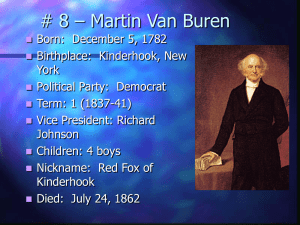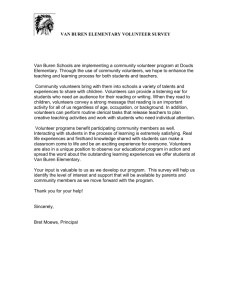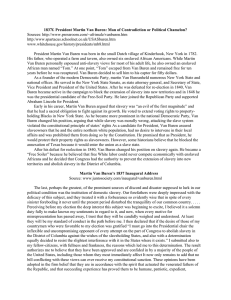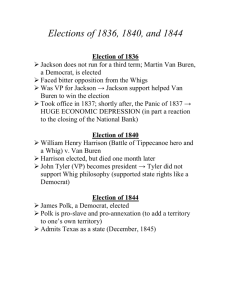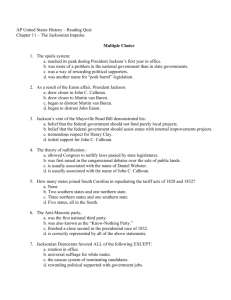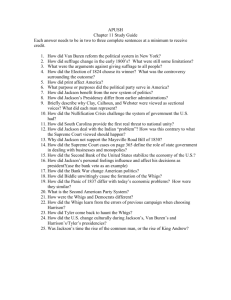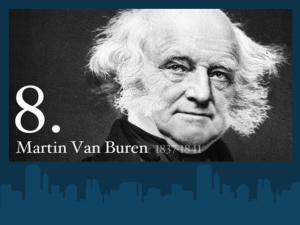Martin Van Buren - The Man
advertisement
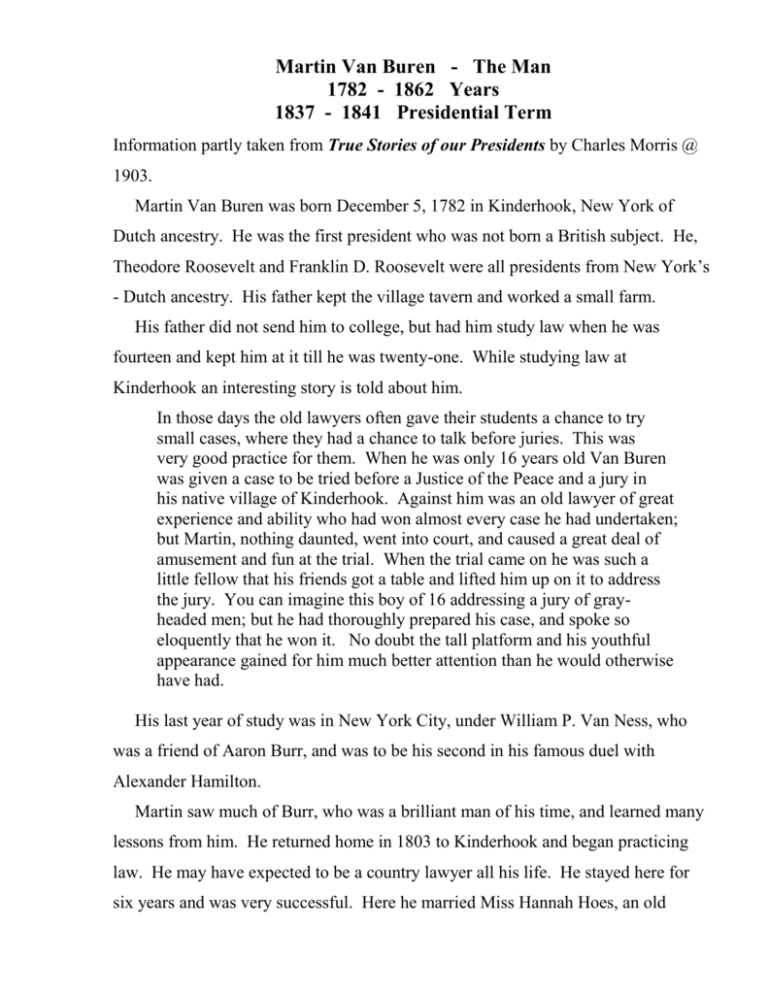
Martin Van Buren - The Man 1782 - 1862 Years 1837 - 1841 Presidential Term Information partly taken from True Stories of our Presidents by Charles Morris @ 1903. Martin Van Buren was born December 5, 1782 in Kinderhook, New York of Dutch ancestry. He was the first president who was not born a British subject. He, Theodore Roosevelt and Franklin D. Roosevelt were all presidents from New York’s - Dutch ancestry. His father kept the village tavern and worked a small farm. His father did not send him to college, but had him study law when he was fourteen and kept him at it till he was twenty-one. While studying law at Kinderhook an interesting story is told about him. In those days the old lawyers often gave their students a chance to try small cases, where they had a chance to talk before juries. This was very good practice for them. When he was only 16 years old Van Buren was given a case to be tried before a Justice of the Peace and a jury in his native village of Kinderhook. Against him was an old lawyer of great experience and ability who had won almost every case he had undertaken; but Martin, nothing daunted, went into court, and caused a great deal of amusement and fun at the trial. When the trial came on he was such a little fellow that his friends got a table and lifted him up on it to address the jury. You can imagine this boy of 16 addressing a jury of grayheaded men; but he had thoroughly prepared his case, and spoke so eloquently that he won it. No doubt the tall platform and his youthful appearance gained for him much better attention than he would otherwise have had. His last year of study was in New York City, under William P. Van Ness, who was a friend of Aaron Burr, and was to be his second in his famous duel with Alexander Hamilton. Martin saw much of Burr, who was a brilliant man of his time, and learned many lessons from him. He returned home in 1803 to Kinderhook and began practicing law. He may have expected to be a country lawyer all his life. He stayed here for six years and was very successful. Here he married Miss Hannah Hoes, an old playmate, and a relative of his mother. For 12 years they lived happily together before she died. He never married again. He moves to Hudson where he gained a wide legal reputation and in 1812 was elected to the Senate of New York State. After General Jackson’s great victory at New Orleans, Van Buren offered a resolution in the Senate to give the thanks of the state to Jackson. Jackson would later repay him for this honor. In 1818 he reorganized the New York Democratic Party, and his power in it became so great that he held absolute control for 20 years. In 1821 New York sent him to the Senate again. In the Presidential election of 1829 he fought hard for the election of Jackson. Van Buren was then Governor of New York. But Jackson asked him to give up his high office and come into his Cabinet as Secretary of State. To many this would not have been a promotion, but it kept him the friendship of Jackson, and other Secretaries of State had been made President. Van Buren continued to curry Jackson’s favor and in his second term named Van Buren as his Vice-President. Jackson used all his vast influence to have Van Buren nominated by the Democrats for the Presidency. The Whigs nominated General Harrison. Van Buren had been a widower for 18 years when he moved into the White House in 1837 with his four sons. Shortly afterward, his eldest son, Major Abraham Van Buren, a West Point graduate, married Angelica Singleton – a southern belle who was probably the most beautiful hostess the White House has ever known. But many Washington ladies criticized her for attempting to establish court airs and customs. It was her habit to wear three large ostrich plumes in her hair and receive her guests seated in an armchair on a raised platform. Jackson had made Van Buren President, but left him with troubling times. By killing the Bank and other acts he brought a business panic on the country which would last Van Buren’s entire term. Therefore, in 1840 the people elected William Henry Harrison. Van Buren personally welcomed Harrison to the White House and entertained him with great courtesy. He was the first U.S. President to welcome a successor from the opposite party. Van Buren would have liked to be President for another term, but retires to New York. Van Buren lost favor with the South because he was not in favor of extending slavery into new territory, thus loosing Democratic Party support. He would run again for the Presidency in 1848 as the Free Soil candidate. In 1853 Mr. Van Buren took a tour of Europe with one of his sons. This was the first time an Ex-President of the U.S. had visited a foreign county. The remainder of his days were passed at his home, called Lindenwald. He died on July 24, 1862 at 80 years of age. He was born just as the Revolutionary War came to an end, and lived to see the opening of the Civil War.

